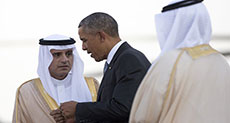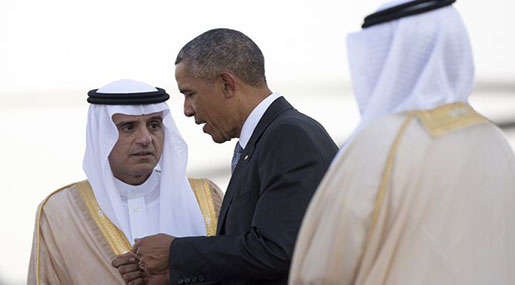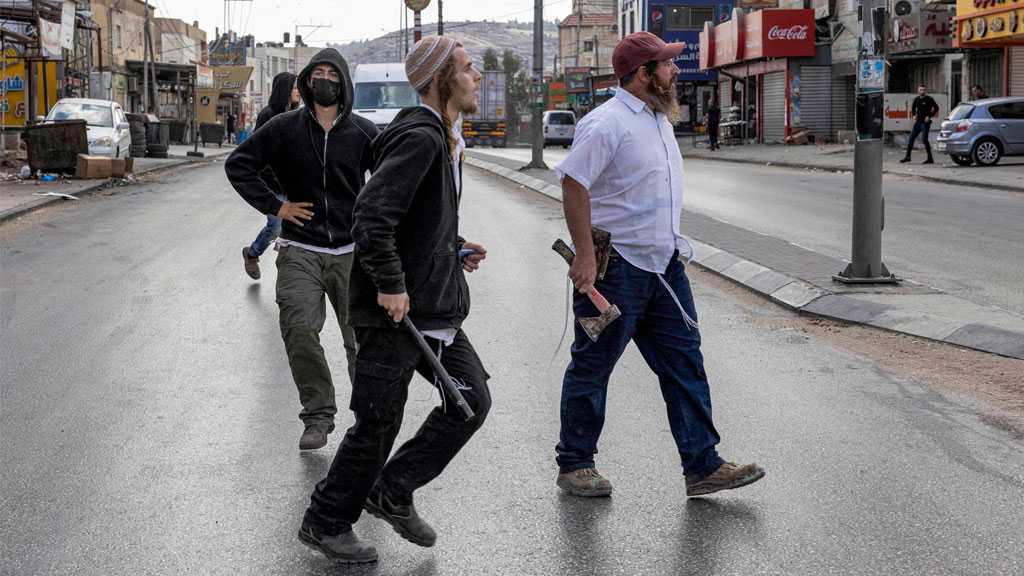Obama May Be Preaching ’Tough Love’ to Saudi - But Arms Sales Tell another Story

Mohamad Bazzi
When President Barack Obama arrived in Saudi Arabia on Wednesday for a meeting of Gulf leaders, he was greeted at the airport by the governor of Riyadh, instead of the Saudi king. Unlike his previous visits, Obama's arrival was not broadcast on Saudi state television with its usual pomp and circumstance. It was one sign of how livid Saudi leaders are at Obama and his administration - the decades-long Saudi-US alliance has rarely been more tense.

Saudi rulers believe that Obama has shifted US foreign policy to be more friendly toward Iran, especially after his administration expended considerable political capital to reach a nuclear deal with Tehran last summer. Obama also reduced direct US involvement in the Middle East, resisting calls to intervene militarily in Syria and to send more US troops to Iraq. And Saudi leaders were particularly upset after Obama suggested in an interview with The Atlantic magazine that they should figure out ways to "share the neighborhood" with Iran.
Despite Saudi anger and US public perception, Obama has not fundamentally altered the "special relationship" between the kingdom and the United States. As Obama has preached a kind of tough love - telling the Saudis that he won't commit US military resources to reflexively support them against Iran - his administration has dramatically ramped up arms sales to the kingdom and other Gulf allies. Since 2010, the Obama administration authorized a record $60bn in US military sales to Saudi Arabia. Since then, the administration concluded deals for nearly $48bn in weapons sales - triple the $16bn in sales under the George W Bush administration.
Even as Obama ramps up arms sales - and US intelligence assistance that helps Saudi Arabia conduct its war in Yemen - American public anger against the kingdom is rising. Members of Congress are pushing through a bill that would allow the Saudi leadership to be held responsible in US courts for the 9/11 terrorist attacks [in which 15 of the 19 hijackers were Saudis] if victims' families can prove that any Saudi officials played a role in the attacks. In response, Saudi officials are threatening to sell off up to $750bn in US assets if the law is adopted.
To the Saudi leadership, the legislation is one more sign of its perceived abandonment by the US during Obama's tenure. And in response, the kingdom is becoming more militarily aggressive, even as it struggles financially due to the global collapse in oil prices.
For decades, Saudi foreign policy was more cautious and less militarized than it is today. Under the former King Abdullah, who died in January 2015 after two decades in power, the kingdom relied on the United States to guarantee its security, and worked through proxies and checkbook diplomacy to advance its interests. But that's changing.
Since he ascended to the throne after Abdullah's death, the new King Salman has pursued a more aggressive foreign policy. Instead of relying on US military intervention and battling Iran through proxies, Salman and his advisers are overturning the old regional order. In March 2015, the new monarch launched a war against Houthi rebels in Yemen - who Saudi leaders accuse of being Iranian proxies - and appointed his 30-year-old son as defense minister [and deputy crown prince] to oversee the campaign.
Salman's increased support for Sunni militants fighting the government in Syria is another example of the kingdom no longer being reliant on the United States. Saudi is taking a more assertive role to counter what it views as Iran's growing regional influence in Yemen, Bahrain and Lebanon.
While Saudi is becoming a more dominant regional actor, the economic foundations of the US-Saudi alliance are still strong. Saudi Arabia, which sits on one-fifth of the world's known oil reserves, is the second-largest foreign oil provider to the United States.
For decades, the kingdom used its leverage within OPEC to keep prices and production at levels that satisfied Washington. In return for ensuring a steady global supply of oil, successive US administrations supported the Saud family and provided military assistance whenever aggressive neighbors like Iraq have threatened the kingdom. In 1990, when Saddam Hussein invaded neighboring Kuwait, the United States sent half a million troops to Saudi Arabia and used it as a base from which to drive the Iraqis out of Kuwait.
About 5,000 US troops remained in the kingdom at the Prince Sultan Air Base, and the high-tech command center served as headquarters for US air strikes on Afghanistan in 2001. The American military presence on Saudi soil enraged Islamic radicals, who decried the Saud's decision to allow "infidel" Western forces into Islam's birthplace. Those troops may no longer be there, but American arms, worth tens of billions, are.
Despite his rhetoric, and his administration's perceived shift toward Iran, Obama has not fundamentally changed the US status quo toward Saudi Arabia. In fact, he's sold more advanced weaponry to Saudi leaders than any of his predecessors. And that means one thing: an emboldened Saudi Arabia will contribute to more war and instability in the Middle East - and America will be drawn into more conflict.
Source: The Guardian, Edited by website team




